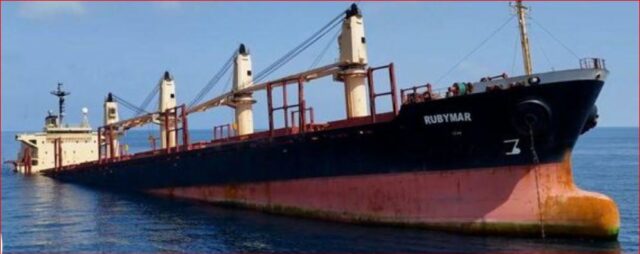A fertiliser-laden bulk carrier which sank off the coast of Yemen on Saturday due to a Houthi missile attack poses a major environmental hazard to the region, warn experts.
MV Rubymar, a Belize-flagged, Lebanese-operated carrier ferrying over 21,000 metric tonnes of ammonium phosphate sulfate fertilizer from the UAE to Bulgaria, sank in the Red Sea almost two weeks after it was hit by Houthi missiles on February 16. While all 24 crew members on the ship were safely evacuated, the fuel and fertiliser released into the sea poses a major hazard to marine life, including coral reefs, and could affect the livelihoods of those who depend on fishing in those waters. The Yemeni government’s environmental protection agency warned of “double pollution” –fuel and fertiliser– that could impact 78,000 fishermen and their families, according to AFP.
The first ship to sink since the Houthis started their Red Sea campaign after the Israeli war on Gaza, the Rubymar was denied permission to dock in Yemen, Djibouti and Saudi Arabia after the missile strike due to environmental concerns.
Launched in 1997, the ill-fated bulk carrier was known as Ken Shin in 1997, Chatham Island in 2009, and Ikaria Island in 2020, before being renamed Rubymar. In 2022, it participated in the Black Sea Grain Initiative, carrying 35,000 tons of wheat from Ukraine to Egypt during the Russian invasion of Ukraine.
“The sinking of the vessel could further breach the hull, allowing water to contact with the thousands of tonnes of fertilizer. Without immediate action, this situation could escalate into a major environmental crisis,” AFP quoted Julien Jreissati, Middle East and North Africa program director at Greenpeace as saying.
The “tonnes of chemicals carried on the sinking vessel Rubymar presents an environmental risk to the Red Sea in the form of algae blooms and damaged coral,” George Wikoff, the head of the US Navy’s Bahrain-based Fifth Fleet, said at a conference in Doha on Tuesday. The ship also “presents a subsurface impact risk” to other ships in the region which carry around 12 percent of global trade, he warned.
Unfazed, Mohammed Ali al-Houthi, a Houthi revolutionary committee leader, said British Prime Minister Rishi Sunak and his government “bear responsibility” for the incident, because of their support of “genocide and siege” in Gaza. In a post on X, formerly Twitter, he demanded a “letter of guarantee” from the British PM to allow aid trucks into Gaza.
Five experts from the United Nations Environment Programme are due in Yemen this week to help assess the situation along with the Yemeni environment ministry.
Also See:
In a career spanning three decades and counting, Ramananda (Ram to his friends) has been the foreign editor of The Telegraph, Outlook Magazine and the New Indian Express. He helped set up rediff.com’s editorial operations in San Jose and New York, helmed sify.com, and was the founder editor of India.com.
His work has featured in national and international publications like the Al Jazeera Centre for Studies, Global Times and Ashahi Shimbun. But his one constant over all these years, he says, has been the attempt to understand rising India’s place in the world.
He can rustle up a mean salad, his oil-less pepper chicken is to die for, and all it takes is some beer and rhythm and blues to rock his soul.
Talk to him about foreign and strategic affairs, media, South Asia, China, and of course India.





